No chance for downtime thanks to STILL Smart Service
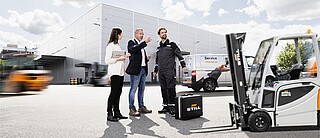
For smooth operations in a modern warehouse, it is crucial that all vehicles are continuously operational. STILL therefore prioritises comprehensive servicing over reactive repairs. The slogan 'Down with your downtime' is both a promise and an aspiration. It requires an acute awareness of customer needs and a commitment to innovation — right through to the training of service technicians
For a long time, service was viewed as a reactive measure: if something broke, it had to be fixed. At first glance, this approach seems obvious, simple and cost-effective, as it requires little advance planning. However, perceptions have changed in intralogistics. This is because warehouses and logistics centres are constantly battling an invisible enemy: downtime. These are hidden but immense cost drivers. A single vehicle breakdown can disrupt an entire intralogistics system. Intelligent countermeasures are needed to prevent this. "When it comes to service, many people still primarily think of repair and maintenance," says Dyrk Draenkow, Head of After Sales. These components are undoubtedly important. "But smart service can do much more," he emphasises, "and that is precisely what we strive for at STILL."
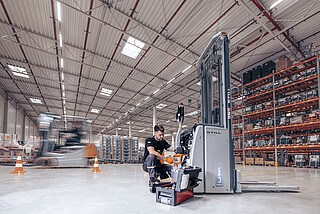
Whether it's a forklift or a high lift pallet truck, consistently high service quality is important to ensure that vehicles and equipment are available. For customers, the complexity of a vehicle or piece of equipment is irrelevant in everyday use – what matters is that it works. This is why STILL provides a comprehensive service: "For us, there are no first- and second-class products," says Draenkow. This applies to all pieces of equipment, whether small or large, manually operated or automated, or from any manufacturer. "Our goal is to provide the same high level of service for all products," emphasises Draenkow. After all, every piece of equipment plays its part in ensuring that the warehouse functions as a single unit. This reduces the total cost of ownership (TCO) and increases performance by minimising downtime.
Service to ensure efficiency
However, this sounds easier than it is. For example, it is important to prevent impact damage and accidents, and to proactively manage fleets in order to reduce energy consumption. "There has long been a mix of energy systems in place, often even within a single warehouse," says Draenkow. Lead-acid batteries, lithium-ion drives and fuel cells each have their own strengths. “But each of these energy sources requires specific measures to ensure that the power provided is used optimally and sustainably,” he explains. Ultimately, that is what it is all about: Proactive, smart servicing should ensure that vehicles and their components function efficiently in the long term. Service technicians must therefore be trained in every type of battery, be able to detect malfunctions early on, and carry out maintenance correctly and safely. "Efficient energy management begins with a service that optimises performance and extends the service life of the systems," says Draenkow.
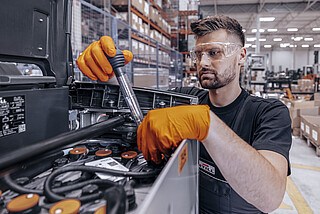
The same applies to the broad field of automation. Here, too, analysing malfunctions is not enough. "Service starts with planning and implementation," explains Draenkow. "We want to cover the entire life cycle of automated solutions." To this end, STILL is constantly checking whether new technologies offer real added value. This is the case with the digital twin, for example, which enables hardware configurations to be carried out quickly and accurately. "But it doesn't necessarily have to be state-of-the-art technology,"' says Draenkow. A well-designed solution can also be effective if it is simple, as this greatly simplifies component replacement and maintenance. STILL is already thinking ahead in vehicle development, focusing on standardised vehicles. In addition, software and partner solutions are being integrated into processes and service concepts. Ultimately, it's all about thinking about service from the customer's perspective, emphasises Draenkow. "We want to offer our customers exactly the service they need, tailored to their requirements and flexible."
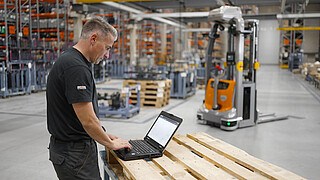
Service technicians are key to success
To effectively tackle these complex challenges across a wide range of products, it is essential to have appropriately trained service technicians. STILL is committed to the motto 'Down with your downtime!'. This is a promise to customers, but it also motivates the technicians. After all, they are the key. "Today, a service technician needs more than just knowledge of machines – they must also be able to solve problems," says Draenkow. STILL's current service technicians must be more versatile than ever, able to repair hydraulic lifting platforms and vehicles from other manufacturers, as well as troubleshoot the hardware of automated forklift trucks. "Versatility and expertise are key," says Draenkow. Ultimately, it's the result that matters to the customer. After all, there are many potential sources of error or failure in a modern warehouse.
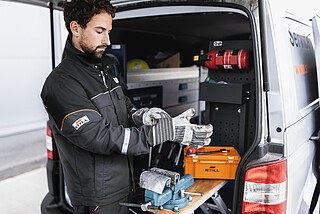
This also means that "the service technician must be available to the customer," says Draenkow. A dense service network is required, with technicians available by telephone at all times. “Customers like to know their service technicians,” adds Draenkow. This creates trust. STILL consistently pursues this approach, to the benefit of both parties. The extensive sales and service network guarantees customers short response times. Technicians who are familiar with the site can also identify critical points more quickly before they become problems. "Ultimately, every breakdown we prevent in advance is efficient for us too," says Draenkow. Emergency service calls are more costly than proactive maintenance. ‘Down with your downtime!’ is not a marketing slogan, but the logical economic consequence of all these factors.
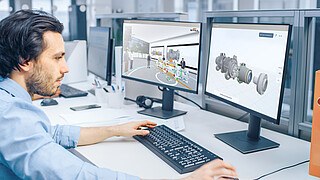
"The idea of the all-knowing technician is outdated"
However, to achieve this and transform service technicians into these resilient 'superheroes', they require appropriate training and further education. In today's fast-paced world of constant innovation, no technician can afford to rest on their laurels, assuming they know all the tricks of the trade and have dealt with every challenge. New issues are constantly emerging. “The idea of an all-knowing service technician is outdated,” says Draenkow. This makes it all the more important to have forward-looking, comprehensive ideas about how to consistently and repeatedly learn and acquire knowledge. 'Blended Learning' is one such approach. A combination of digital learning and practical training: Employees can work through the content at their own pace while benefiting from a broad range of digital tools to expand and consolidate their knowledge in the long term. “Colleagues receive targeted training on topics relevant to their area of responsibility and are connected to the company's collective knowledge via digital tools,” explains Draenkow. This may be because certain vehicles are primarily used in their area, or because special technologies are widespread. This enables them to resolve problems as quickly and efficiently as possible at the customer's site, or even better, to proactively prevent them from arising in the first place. “Although our service technicians do not need to be all-knowing, they are networked in such a way that they end up knowing it all at the right time,” says Draenkow.
Contact request
Subscribe to the Newsletter !
Always up to date with STILL: Subscribe to the STILL newsletter and we will inform you regularly about interesting industry topics.
